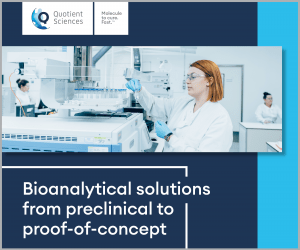Integrating bioanalysis with clinical studies and pharmacokinetics: an interview with Stuart McDougall

In this interview Stuart McDougall, Head of Bioanalytical Services at Arcinova (Northumberland, UK), discusses the technologies used to generate fast, reliable data for drug development and how recently Arcinova has been acquired by Quotient Sciences. He explains what this new partnership means and how Arcinova/Quotient are preparing to address the needs of the future.
-
Tell us a bit about Arcinova?
On face value Arcinova is a relatively young company, having been founded only in 2016. However, the site was previously owned by one of the world’s largest pharma companies and many of our scientists have worked in this facility since the 80’s and 90’s. Therefore, for a new kid on the block, we have a surprisingly deep heritage in pharmaceutical research and development.
Arcinova provides bioanalytical services across all stages of drug development, supporting early discovery and preclinical studies through to clinical Phase II and Phase III studies. The team has decades of experience in developing and validated over 400 bespoke assays for a wide variety of small molecules, biomarkers, polypeptides and proteins.
-
What technologies do you commonly use to generate fast, reliable data for drug development?
All the bioanalytical work is mass spectrometry-based, including liquid chromatography−mass spectrometry (LC−MS), gas chromatography−mass spectrometry (GC−MS) and inductively coupled plasma mass spectrometry (ICP−MS), which is one of our specialty areas. ICP−MS capability allows the team to measure elements that are very specific to a drug and there are very few companies who can offer a service as robust as ours.
Want to learn more about Arcinova/Quotient Sciences? Click here to find out about bioanalytical solutions from preclinical to proof-of-concept>>
-
Recently Arcinova was acquired by Quotient Sciences, how does this change things?
The coming together of Quotient Sciences and Arcinova is a perfect fit. Quotient Sciences is a leading drug development organization with clinical pharmacology units in the UK and US – performing a range of First-in-Human (FIH) and Phase I clinical trials. The company has a large Data Sciences group which provides pharmacokinetics, statistical analysis and data management services – but a key gap in Quotient’s service portfolio was bioanalysis – and now this gap can now be addressed.
Forging ahead, the combined business looks to expand on several fronts. The immediate opportunity is to integrate bioanalytical services with clinical pharmacology, pharmacokinetics and data sciences services – this integrated offering will provide clients the ability to move seamlessly from clinic to lab to rapid analysis and interpretation – speeding up clinical development times. Secondly, there will also be investment in new bioanalytical technologies and instrumentation to remain cutting edge and supporting customer needs.
-
On a practical level, how does integrating clinical pharmacology, bioanalysis and pharmacokinetics actually speed up clinical development times?
Time savings come in the form of efficiencies which are formed from the integration. Transfers of information and data move from being external to internal, allowing a set of agreed standard specifications/timelines (e.g. data transfer), being able to jointly track of samples, which will allow close coordination of delivery days to minimize white space/delays. All of which will be managed under a single quotient project manager for all services managing and driving the whole project timeline.
It also facilitates a much easier relationship with clients, with continuity of contacts, methods and templates, the same bioanalytical, pharmacokinetic, project manager, sample shipment/management contacts for clients throughout development.
-
Where do you see the future of the bioanalytical services industry and how is Arcinova/Quotient preparing to address needs of the future?
Contract bioanalytical services will continue to grow to meet the market demands. Whilst historically, most large pharmaceutical companies traditionally performed their bioanalysis in house, that model has dramatically changed over the last 10 years, with the majority now performed by CRO’s. Consequently, the intrinsic knowledge and new generation of bioanalytical scientists now reside with the CRO’s, who can now leverage that to support both traditional pharma and emerging biotech companies, who’s knowledge in this field may be limited. As our knowledge spans both pharma and CRO, we are in an ideal environment to support and guide our clients and this demand will continue to grow. We continue to invest in both technology and people, so the future is assured.
In addition, whilst we have developed expertise in fast elemental (ICP−MS), volatile (GC−MS) and traditional small molecule NCE (LC−MS) bioanalysis, we envision the selectivity and sensitivity of MS based assays being directed towards biological molecules, spanning polypeptides and small proteins up to monoclonal antibodies. Quotient have already developed many years of experience providing specific and sensitive ‘top-down’ assays for polypeptides and protein, but have now developed workflows for ‘bottom-up’ approaches for the larger NBEs.
 About Stuart McDougall
About Stuart McDougall
Stuart has 28 years of experience in the pharmaceutical industry within metabolism, pharmacokinetic and bioanalysis roles. Previous relevant positions include global leader of Sanofi-Aventis (Paris, France) bioanalytical strategy team and a member of Covance (Alnwick, UK) global bioanalytical leadership team.
Stuart is a pharmacology graduate from the University of Dundee (Scotland), a harmonization team leader for the Global Bioanalytical Consortium (GBC), representative on the European Bioanalytical Forum (EBF) and is an author and co-author of numerous scientific papers.
In association with


